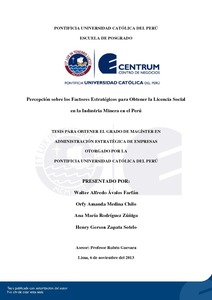| dc.contributor.advisor | Guevara Moncada, Rubén | |
| dc.contributor.author | Ávalos Farfán, Walter Alfredo | es_ES |
| dc.contributor.author | Medina Chilo, Orfy Amanda | es_ES |
| dc.contributor.author | Rodríguez Zúñiga, Ana María | es_ES |
| dc.contributor.author | Zapata Sotelo, Henry Gerson | es_ES |
| dc.date.accessioned | 2017-05-26T21:06:18Z | |
| dc.date.available | 2017-05-26T21:06:18Z | |
| dc.date.created | 2013 | |
| dc.date.issued | 2017-05-26 | |
| dc.identifier.uri | http://hdl.handle.net/20.500.12404/8698 | |
| dc.description.abstract | Las cifras económicas ubican a la industria minera en una posición importante en el
desarrollo económico del país; sin embargo, múltiples efectos negativos asociados a esta
actividad, tales como el impacto en el medio ambiente o los cambios en la forma de vida de
las comunidades aledañas, que muchas veces han tenido que ser reubicadas para subsistir,
han generado el incremento de los conflictos sociales alrededor de la operación, poniendo en
riesgo su continuidad y, por ende, desalentando potenciales inversiones futuras.
La licencia social, entendida como la aprobación que una comunidad confiere a la
empresa para desarrollar sus actividades, constituye el resultado final de los mecanismos para
prevenir y/o enfrentar los conflictos sociales que ponen en riesgo la ejecución del proyecto.
En tal sentido, la presente investigación busca identificar desde la percepción empresarial,
aquellos factores estratégicos que la empresa debería incorporar en sus estrategias para
obtener la Licencia Social; se detallan estos factores en las cuatro fases: preparación,
construcción de espacios de diálogo, negociación y concertación, que sumadas forman el
proceso para la obtención de la Licencia Social para operar.
Los resultados de la investigación ponen en evidencia la importancia de construir
relaciones con los grupos de interés basadas en la legitimidad, credibilidad y confianza,
atributos que se fortalecen con una vocación por el diálogo y un esfuerzo continuo por lograr
acuerdos que armonicen las legítimas demandas de las comunidades y los objetivos
estratégicos de la empresa | es_ES |
| dc.description.abstract | Economic data located the extractive industries in an important position in the
economic development of the country, but many negative effects associated with this activity,
such as the impact on the environment or changes in the lifestyles of the people who live in
the surrounding communities and often had to be relocated to survive, have generated the
increased social conflicts around the operation, jeopardizing its continuity and thus
discouraging future potential investment.
The social license, understood as the approval that community gives the company to
develop its extractive activities, is the end result of the mechanisms to prevent and / or face
social conflicts that threaten the project. In this sense, this research seeks to identify the key
aspects to identify from the business perception, those strategic factors that the company
should incorporate into their strategies to obtain the four phases; preparation, construction of
spaces for dialogue, negotiation and consultation, which together form the process for
obtaining the Social License to operate.
The research results highlight the importance of building relationships with
stakeholders based on the legitimacy, credibility and trust, attributes that are strengthened
with a vocation for dialogue and an ongoing effort to reach agreements that harmonize the
legitimate demands of communities and strategic company’s objectives | es_ES |
| dc.language.iso | spa | es_ES |
| dc.publisher | Pontificia Universidad Católica del Perú | es_ES |
| dc.rights | Atribución-NoComercial-SinDerivadas 2.5 Perú | * |
| dc.rights | info:eu-repo/semantics/openAccess | es_ES |
| dc.rights.uri | http://creativecommons.org/licenses/by-nc-nd/2.5/pe/ | * |
| dc.subject | Industria minera -- Perú | es_ES |
| dc.subject | Industria minera -- Aspectos sociales -- Perú | es_ES |
| dc.title | Percepción sobre los factores estratégicos para obtener la licencia social en la Industria minera en el Perú | es_ES |
| dc.type | info:eu-repo/semantics/masterThesis | es_ES |
| thesis.degree.name | Magíster en Administración Estratégica de Empresas | es_ES |
| thesis.degree.level | Maestría | es_ES |
| thesis.degree.grantor | Pontificia Universidad Católica del Perú. CENTRUM | es_ES |
| thesis.degree.discipline | Administración Estratégica de Empresas | es_ES |
| renati.advisor.orcid | https://orcid.org/0000-0002-4795-2557 | es_ES |
| renati.discipline | 413307 | es_ES |
| renati.level | https://purl.org/pe-repo/renati/level#maestro | es_ES |
| renati.type | https://purl.org/pe-repo/renati/type#tesis | es_ES |
| dc.publisher.country | PE | es_ES |
| dc.subject.ocde | https://purl.org/pe-repo/ocde/ford#5.02.04 | es_ES |






